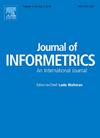Factorize international mobility on academic performance: a time-varying DID method examining over 7million Chinese scholars
IF 3.5
2区 管理学
Q2 COMPUTER SCIENCE, INTERDISCIPLINARY APPLICATIONS
引用次数: 0
Abstract
Objective
International academic mobility of researchers provides them with access to global knowledge and innovation and shaping their research activities. This study seeks to examine the impact of international mobility on academic performance of researchers.
Method
We first visualized changes in researchers' academic performance before and after mobility. Then, we employed the Time-varying Difference-in-Differences (DID) model and Propensity Score Matching (PSM) methodology to uncover the impact of international mobility on researchers. Finally, we delved deeper into the relationship between international mobility patterns and academic performance.
Results
The visualized analysis results highlight substantial academic advancement in disciplines such as Biomedical and Life Sciences. Notably, researchers returning to China after mobility exhibit the most significant impact on academic performance, followed by those engaged in multiple movements ('circulation') across countries. In contrast, the 'emigration' group, not returning to China after mobility, exhibits the lowest impact on academic performance.
Conclusions
These results emphasize how international academic mobility significantly boosts researchers' academic performance. Particularly, researchers returning to China after mobility demonstrate the most substantial impact on academic performance. However, the noticeable surge in researchers leaving China presents a challenge in retaining their expertise. Therefore, it's crucial to promote active participation in international mobility while developing strategies to retain expertise post-mobility, which is vital for the scientific development of China.
考虑国际流动性对学业成绩的影响:基于时变DID方法对700多万中国学者的检验
研究人员的国际学术流动为他们提供了获得全球知识和创新的机会,并塑造了他们的研究活动。本研究旨在探讨国际流动对研究人员学术表现的影响。方法首先观察研究人员活动前后学业成绩的变化。然后,我们采用时变差分差分(DID)模型和倾向得分匹配(PSM)方法来揭示国际流动对研究人员的影响。最后,我们深入探讨了国际流动模式与学习成绩之间的关系。结果可视化的分析结果突出了生物医学和生命科学等学科的实质性学术进步。值得注意的是,研究人员在流动后返回中国对学业表现的影响最大,其次是那些在不同国家进行多次流动(“循环”)的研究人员。相比之下,“移民”组在流动后没有返回中国,对学业成绩的影响最小。结论这些结果强调了国际学术流动对科研人员学术表现的显著促进作用。特别是,研究人员流动后回国对学业成绩的影响最为显著。然而,离开中国的研究人员的显著增加给留住他们的专业知识带来了挑战。因此,在促进人才积极参与国际流动的同时,制定人才流动后的人才留存策略,对中国的科学发展至关重要。
本文章由计算机程序翻译,如有差异,请以英文原文为准。
求助全文
约1分钟内获得全文
求助全文
来源期刊

Journal of Informetrics
Social Sciences-Library and Information Sciences
CiteScore
6.40
自引率
16.20%
发文量
95
期刊介绍:
Journal of Informetrics (JOI) publishes rigorous high-quality research on quantitative aspects of information science. The main focus of the journal is on topics in bibliometrics, scientometrics, webometrics, patentometrics, altmetrics and research evaluation. Contributions studying informetric problems using methods from other quantitative fields, such as mathematics, statistics, computer science, economics and econometrics, and network science, are especially encouraged. JOI publishes both theoretical and empirical work. In general, case studies, for instance a bibliometric analysis focusing on a specific research field or a specific country, are not considered suitable for publication in JOI, unless they contain innovative methodological elements.
 求助内容:
求助内容: 应助结果提醒方式:
应助结果提醒方式:


